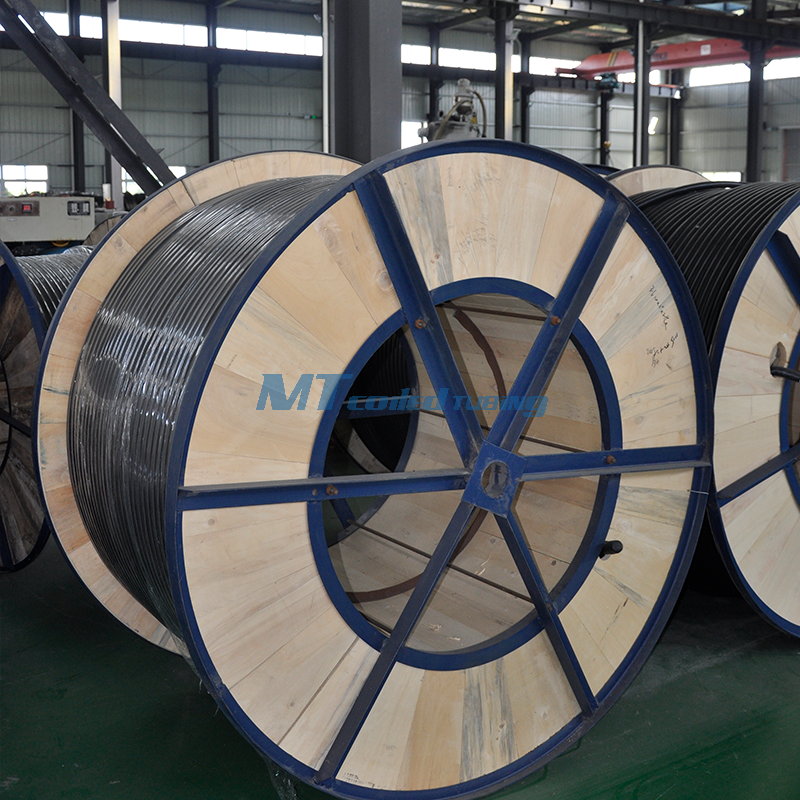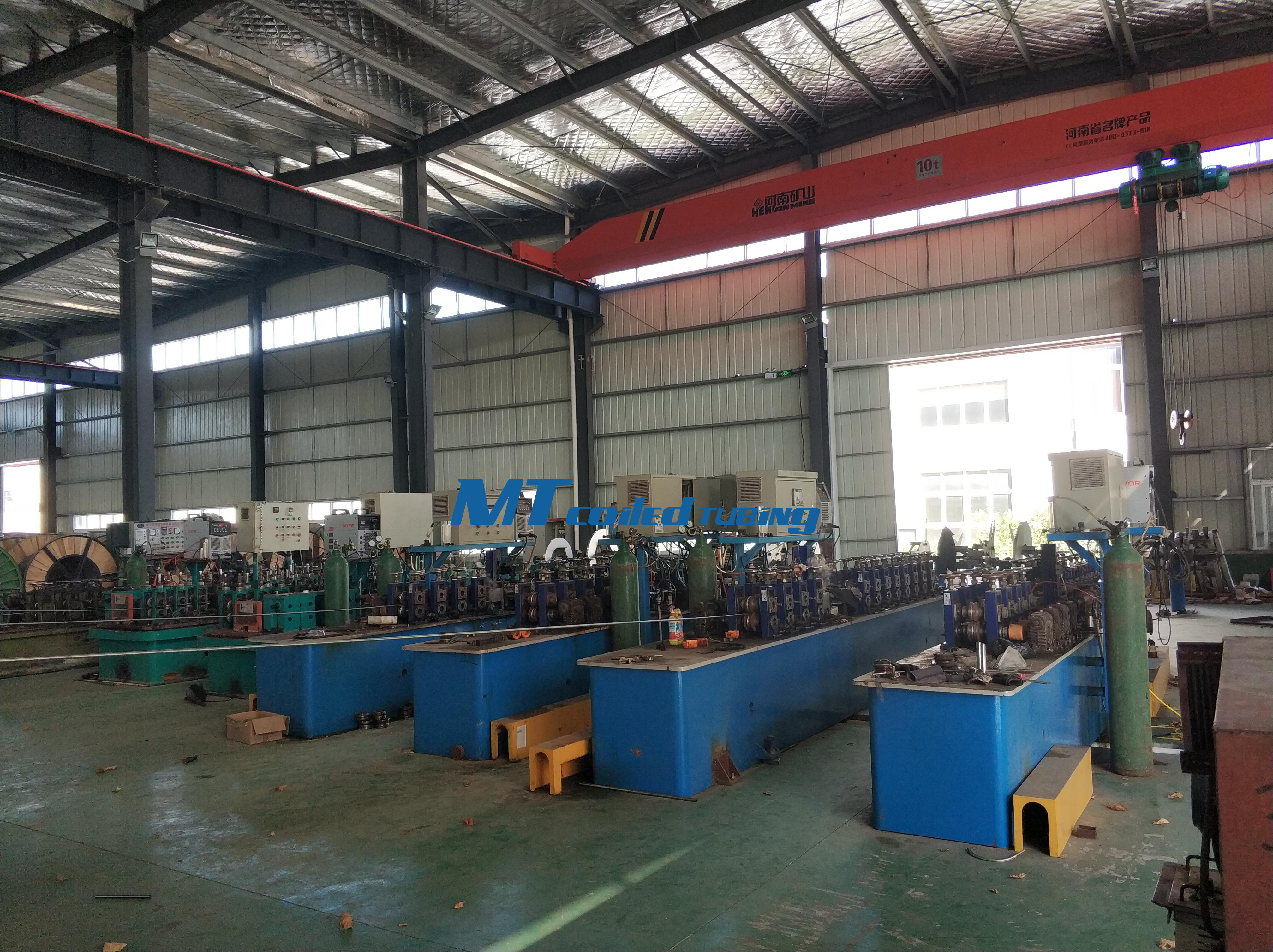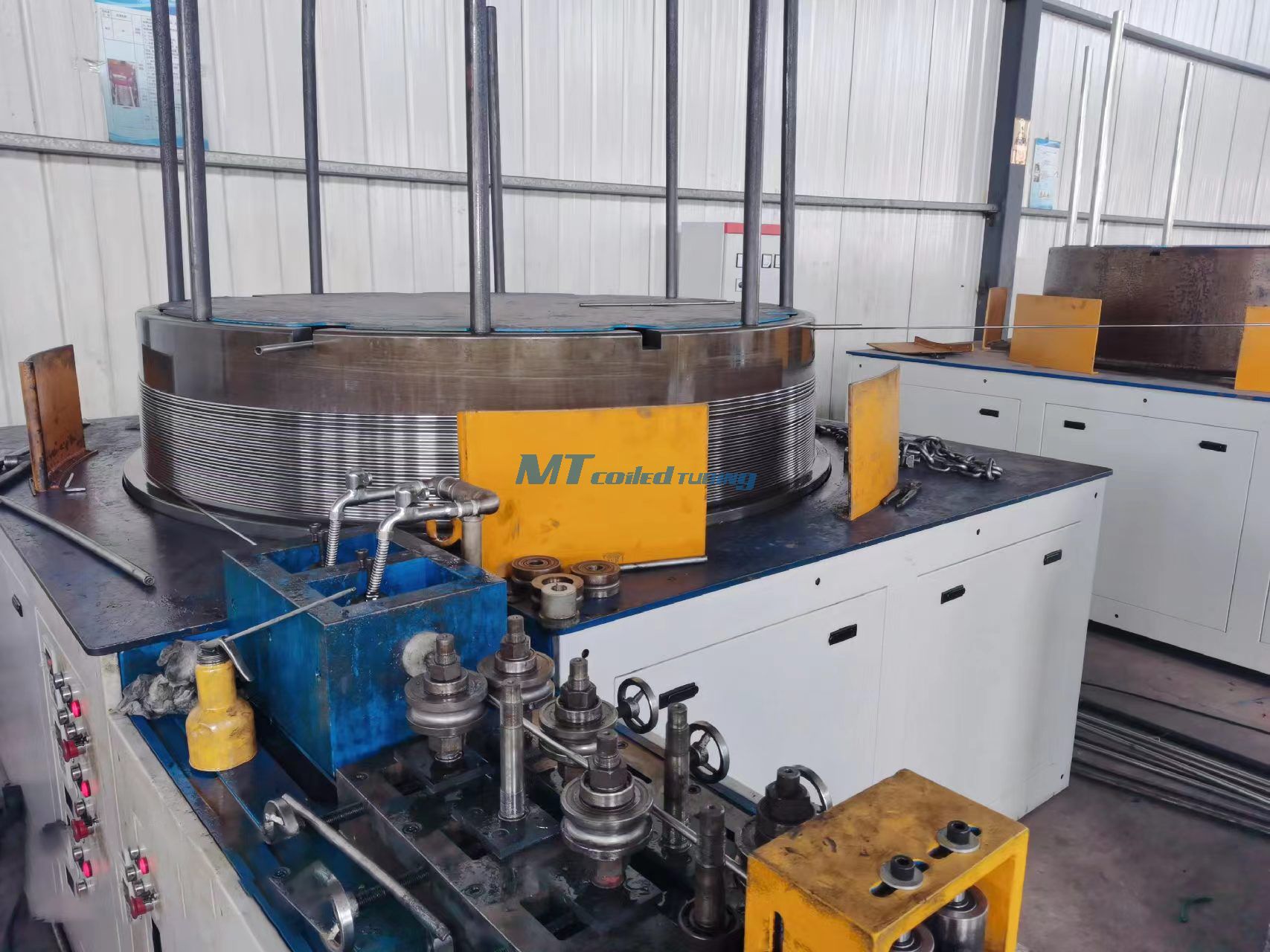| Availability: | |
|---|---|
| Quantity: | |
Grade | Alloy 600/N06600, Alloy 601/N06601, Alloy 825/N08825, Alloy 625 /N06625, Alloy 400/ N04400, 2205, 2507, TP316/L, TP304/L, etc |
Type | Welded |
Hole count | Single/Multi Core |
Outer Diameter | 1/4'', 3/8'', 1/2'' |
Wall Thickness | 0.035”, 0.049'', 0.065” |
Length | According to customers' needs, up to 10000m |
Standard | ASTM A269/A213/A789/B704/B163,etc. |
Certificate | ISO/CCS/DNV/BV/ABS, etc. |
Inspection | NDT; Hydrostatic test |
Package | Wooden or iron reel |
Features of Nickel Alloy Coiled Tubing
High creep fracture strength
Resistant to oxidation at 1800°F
Good fatigue resistance
Excellent weldability
Excellent resistance to chloride pitting and crevice corrosion
Resistant to chloride ion stress corrosion cracking
Resistant to seawater under flowing and stagnant conditions as well as under contaminated conditions
 |  |
Alloy 600 Chemical Composition:
% | Ni | Cr | Fe | C | Mn | Si | S | Cu |
min | 72.0 | 14.0 | 6.0 | |||||
max | 17.0 | 10.0 | 0.15 | 1.00 | 0.50 | 0.015 | 0.50 |
Alloy 601 Chemical Composition:
% | Ni | Cr | Fe | C | Mn | Si | S | Al |
min | 58.0 | 21.0 | balance | 1.00 | ||||
max | 63.0 | 25.0 | 0.10 | 1.00 | 0.50 | 0.015 | 1.70 |
What is a control line seal?
For a variety of reasons, many wells have a hydraulic control line that runs down the casing or tubing and is used to control valves or sleeves or other equipment.
Sometimes these control lines leak and can no longer be used, and sometimes they are just not needed anymore.
These control lines can extend downhole for hundreds or even thousands of meters.
Faulty control lines can be the source of accidental leaks. In the abandonment phase, control lines can be the source of pressure migration or piping.

Terms & Conditions | Price Item | FOB, CFR, CIF or as negotiation |
Payment | T/T, LC or as negotiation | |
Delivery Time | 30 working days after received your deposit (Normally according to the order quantity) | |
Package | Wooden or iron reel or as per customer’s requirement | |
Quality Requirement | Mill Test Certificate will be supplied with shipment, Third Part Inspection is acceptable | |
Quality | Test | NDT(Ultrasonic test, Eddy Current test) |
Mechanical Test(Tension Test, Flaring Test, Flattening Test, Hardness Test, Hydraulic test) | ||
Metal Test(Metallographic Analysis, Impact Test-High/low temperature) | ||
Chemical Analysis(Photoelectric Emission Spectroscopic) | ||
Market | Main Market | Europe, Middle East, Southeast Asia, South America. etc |
An increasing number of projects in the oil service industry require the use of continuous lengths of nickel alloy control lines. They are used in a variety of applications, including chemical injection, hydraulic control, instrumentation umbilicals and flowline control. MTSCO offers products for all of these applications, helping customers reduce operating costs and improve recovery methods.
MTSCO can provide continuous tubing for nickel alloy, stainless steel and duplex control lines. Sizes, lengths, pressure levels, packaging methods, etc. can all be customized to improve your oil recovery methods and reduce operating costs.
 |   |
Grade | Alloy 600/N06600, Alloy 601/N06601, Alloy 825/N08825, Alloy 625 /N06625, Alloy 400/ N04400, 2205, 2507, TP316/L, TP304/L, etc |
Type | Welded |
Hole count | Single/Multi Core |
Outer Diameter | 1/4'', 3/8'', 1/2'' |
Wall Thickness | 0.035”, 0.049'', 0.065” |
Length | According to customers' needs, up to 10000m |
Standard | ASTM A269/A213/A789/B704/B163,etc. |
Certificate | ISO/CCS/DNV/BV/ABS, etc. |
Inspection | NDT; Hydrostatic test |
Package | Wooden or iron reel |
Features of Nickel Alloy Coiled Tubing
High creep fracture strength
Resistant to oxidation at 1800°F
Good fatigue resistance
Excellent weldability
Excellent resistance to chloride pitting and crevice corrosion
Resistant to chloride ion stress corrosion cracking
Resistant to seawater under flowing and stagnant conditions as well as under contaminated conditions
 |  |
Alloy 600 Chemical Composition:
% | Ni | Cr | Fe | C | Mn | Si | S | Cu |
min | 72.0 | 14.0 | 6.0 | |||||
max | 17.0 | 10.0 | 0.15 | 1.00 | 0.50 | 0.015 | 0.50 |
Alloy 601 Chemical Composition:
% | Ni | Cr | Fe | C | Mn | Si | S | Al |
min | 58.0 | 21.0 | balance | 1.00 | ||||
max | 63.0 | 25.0 | 0.10 | 1.00 | 0.50 | 0.015 | 1.70 |
What is a control line seal?
For a variety of reasons, many wells have a hydraulic control line that runs down the casing or tubing and is used to control valves or sleeves or other equipment.
Sometimes these control lines leak and can no longer be used, and sometimes they are just not needed anymore.
These control lines can extend downhole for hundreds or even thousands of meters.
Faulty control lines can be the source of accidental leaks. In the abandonment phase, control lines can be the source of pressure migration or piping.

Terms & Conditions | Price Item | FOB, CFR, CIF or as negotiation |
Payment | T/T, LC or as negotiation | |
Delivery Time | 30 working days after received your deposit (Normally according to the order quantity) | |
Package | Wooden or iron reel or as per customer’s requirement | |
Quality Requirement | Mill Test Certificate will be supplied with shipment, Third Part Inspection is acceptable | |
Quality | Test | NDT(Ultrasonic test, Eddy Current test) |
Mechanical Test(Tension Test, Flaring Test, Flattening Test, Hardness Test, Hydraulic test) | ||
Metal Test(Metallographic Analysis, Impact Test-High/low temperature) | ||
Chemical Analysis(Photoelectric Emission Spectroscopic) | ||
Market | Main Market | Europe, Middle East, Southeast Asia, South America. etc |
An increasing number of projects in the oil service industry require the use of continuous lengths of nickel alloy control lines. They are used in a variety of applications, including chemical injection, hydraulic control, instrumentation umbilicals and flowline control. MTSCO offers products for all of these applications, helping customers reduce operating costs and improve recovery methods.
MTSCO can provide continuous tubing for nickel alloy, stainless steel and duplex control lines. Sizes, lengths, pressure levels, packaging methods, etc. can all be customized to improve your oil recovery methods and reduce operating costs.
 |   |